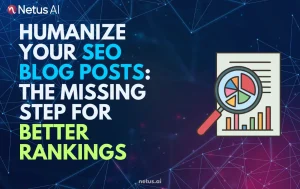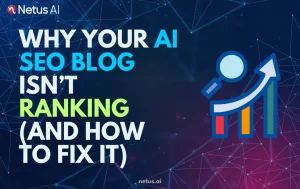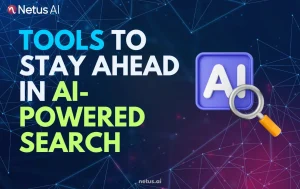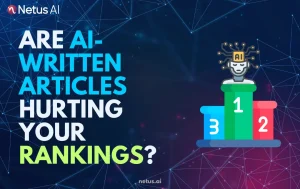
Why Humanized SEO Blog Posts Rank Higher | NetusAI
Humanize Your SEO Blog Posts: The Missing Step for Better Rankings You’ve done everything by the book. Your keyword research is impeccable. Your meta descriptions
Will AI Replace All Kinds of Journalists and Writers?
Exploring the Future of Automated Content Creation

Content writer and editor for Netus.AI
Will AI Replace All Kinds of Journalists and Writers? Artificial intelligence (AI) is a rapidly advancing technology that is changing the way we live and work. One area where AI is having a significant impact is in the field of journalism and writing. With the development of AI-powered tools that can write news articles, generate content, and even create entire books, many people are wondering if AI will replace all kinds of journalists and writers.
While AI has already proven to be a valuable tool for journalists and writers, it is unlikely that it will completely replace human writers. While AI can generate content quickly and efficiently, it lacks the creativity, nuance, and emotional intelligence that human writers bring to their work. Additionally, AI-generated content often lacks the depth and context that is necessary for truly insightful and engaging writing.
However, AI is already being used to supplement and enhance human writing, and it is likely that this trend will continue. As AI technology continues to improve, it may become increasingly difficult to distinguish between content written by humans and content generated by AI. Ultimately, the future of journalism and writing will likely involve a combination of human and AI-generated content, with each playing a unique and valuable role in the process.
AI has been used in journalism for many years, but it was primarily used as a tool to assist human journalists. For example, Google’s AI-powered tools helped journalists to fact-check their stories and find relevant sources. However, AI has evolved to become more than just a tool. It is now being used as a storyteller to generate news stories on its own.
The use of AI-generated news stories has the potential to revolutionize the media industry. Media companies are already using AI platforms to create content, and this trend is likely to continue. AI-generated news stories can be produced faster and cheaper than stories written by human journalists. This could lead to a reduction in the number of journalists employed by news organizations.
Generative AI is a form of AI that can create content, such as news stories, on its own. OpenAI’s chatbot GPT-3 is an example of generative AI that has been used to create news stories. However, there are concerns about the quality and accuracy of content created by generative AI. Some experts argue that AI-generated content lacks the craft and nuance of human-written stories.
In conclusion, AI has evolved from being a tool to assist human journalists to becoming a storyteller that can generate news stories on its own. The impact of AI on the media industry is still being explored, but it has the potential to revolutionize the way news stories are produced. However, there are concerns about the quality and accuracy of AI-generated content, and it remains to be seen how this technology will be integrated into the world of journalism.
One of the most important roles of human journalists is to uphold ethical standards in reporting. Ethics in journalism are crucial as they ensure that the public receives accurate and unbiased information. Human journalists are trained to adhere to ethical guidelines and principles such as truth, accuracy, fairness, and impartiality. They have a responsibility to report the facts and to provide context to help readers understand the significance of the information presented.
Human journalists bring a unique perspective to storytelling that cannot be replicated by AI. They have the ability to convey empathy, emotion, and passion in their writing that can touch readers on a personal level. The human touch in storytelling is what makes journalism relatable and engaging. It is what draws readers in and keeps them interested in the story.
While AI can assist in certain aspects of journalism such as data analysis and fact-checking, it cannot replace the expertise of human journalists. Human journalists have years of experience and training in their field, which allows them to provide insights and analysis that AI cannot. AI can be a useful tool for journalists, but it cannot replace the human element in journalism. Collaboration between AI and human journalists can lead to more accurate and comprehensive reporting.
In conclusion, human journalists play a critical role in journalism. They bring a unique perspective and expertise that cannot be replicated by AI. While AI can assist in certain aspects of journalism, it cannot replace the human touch in storytelling and the ethical considerations that are crucial to the profession.
One of the significant challenges of AI in writing is understanding context and nuance. AI models are trained on large datasets, and they rely on patterns and statistical analysis to generate text. However, language is not always straightforward, and it can be challenging to understand the context and the underlying meaning of a piece of text. For instance, a sentence such as “I saw her duck” can have multiple meanings, depending on the context. AI models may struggle to understand such subtleties and generate accurate text.
AI in writing also faces the challenge of combating misinformation and disinformation. With the rise of fake news and deepfakes, it is crucial to ensure that the content generated by AI is accurate and reliable. However, AI models can also be trained on biased or incomplete datasets, which can lead to the propagation of misinformation. It is essential to develop robust fact-checking mechanisms to ensure that the content generated by AI is trustworthy.
AI has shown significant potential in generating creative writing, such as poetry and fiction. However, there is a debate about whether AI can truly be creative or if it is merely mimicking existing patterns. Additionally, AI-generated content may lack the emotional depth and authenticity that human writers can bring to their work. As AI technology continues to advance, it is likely that we will see more creative writing generated by AI. However, it remains to be seen whether AI can truly replace human creativity in writing.
In conclusion, AI in writing faces several challenges and limitations, such as understanding context and nuance, combating misinformation and disinformation, and replicating human creativity. While AI has shown significant potential in generating written content, it is essential to develop robust mechanisms to ensure that the content generated by AI is accurate, reliable, and trustworthy.
The rise of AI in journalism and writing has led to concerns about the future of jobs in the industry. While AI can automate some tasks, it cannot entirely replace human journalists and writers. However, it is likely that AI will transform the job market, with some jobs becoming obsolete and others requiring new skills.
According to a report by the Reuters Institute for the Study of Journalism, AI is expected to replace journalists in tasks such as data analysis, fact-checking, and news aggregation. This could lead to a reduction in the number of jobs available for journalists who specialize in these areas.
On the other hand, AI can also create new job opportunities. For example, AI can help news organizations to personalize content for their readers, creating a demand for journalists with skills in data analysis and programming.
The rise of AI also has implications for journalism education. Journalism schools need to adapt their curricula to ensure that students are equipped with the skills needed in the AI-driven media landscape.
For example, students should be taught how to use AI tools for data analysis and news aggregation. They should also be taught how to work with AI systems and how to write stories that are optimized for AI-driven news platforms.
The financial impact of AI on news organizations is a topic of concern. While AI can reduce costs by automating some tasks, it also requires significant investment in technology and infrastructure.
Moreover, the use of AI in news production could lead to a decline in quality, with news organizations prioritizing speed and efficiency over accuracy and depth. This could have a negative impact on the credibility of news organizations and their ability to attract readers and advertisers.
In conclusion, while AI is likely to transform the journalism and writing industries, it cannot entirely replace human journalists and writers. The job market will undergo significant changes, with some jobs becoming obsolete and others requiring new skills. Journalism schools need to adapt their curricula to ensure that students are equipped with the skills needed in the AI-driven media landscape. Finally, news organizations need to carefully consider the financial implications of AI and ensure that quality is not sacrificed for efficiency.
As AI continues to evolve and become more integrated into the field of journalism and writing, it is important for organizations and individuals to establish codes of conduct that outline ethical considerations when using these technologies. These codes of conduct should address issues such as transparency, accountability, and the potential biases that may be introduced by AI systems.
One of the most important considerations when using AI in journalism and writing is maintaining the trust and integrity of the profession. This means ensuring that AI systems are used in a responsible and ethical manner, and that they do not compromise the accuracy or impartiality of the content being produced. It also means being transparent about the use of AI systems, and making sure that readers and audiences are aware of how these technologies are being used.
As AI becomes more prevalent in journalism and writing, there is a growing responsibility to ensure that these technologies are used in a way that benefits society as a whole. This means considering the impact of AI on issues such as privacy, security, and the distribution of power and resources. It also means being mindful of the potential for AI to exacerbate existing inequalities, and taking steps to address these issues.
Overall, navigating the ethical landscape of AI in journalism and writing requires a commitment to upholding the values and principles of the profession, while also being open to the possibilities that these technologies offer. By establishing clear codes of conduct, maintaining trust and integrity, and taking responsibility for the impact of AI on society, journalists and writers can ensure that these technologies are used in a way that benefits everyone.

Humanize Your SEO Blog Posts: The Missing Step for Better Rankings You’ve done everything by the book. Your keyword research is impeccable. Your meta descriptions

How to Pass AI Detection Tests as an SEO Writer Let’s paint a familiar picture. You’ve just finished a blog post. The headline is sharp,

Why Your AI SEO Blog Isn’t Ranking (And How to Fix It) You embraced AI for your blog. The promise was intoxicating: high-quality content, published

The Modern SEO Writer’s Stack: Tools to Stay Ahead in AI-Powered Search Remember the days when “SEO writing” conjured images of frantic keyword stuffing, awkward

Are AI-Written Articles Hurting Your Rankings? Here’s How to Fix Them You jumped on the AI content train because it promised speed, scale and liberation

How to Paraphrase AI Content Without Losing SEO Value AI writing tools are a game-changer. One minute you’re staring at a blank page, paralyzed by
@ 2024 Netus AI.